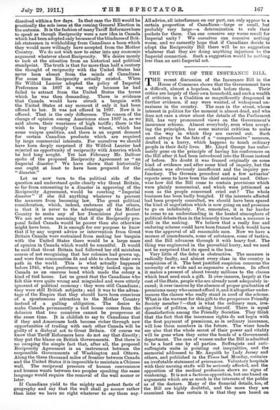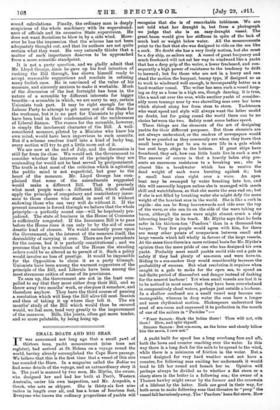THE FUTURE OF THE INSURANCE BILL. T HE recent discussion of
the Insurance Bill in the House of Commons shows that the Government have a difficult, almost a hopeless, task before them. Their critics are largely of their own household, and such a wealth of criticism in a Coalition so magnificently dragooned is further evidence, if any were wanted, of widespread un- easiness in the country. The man in the street, whose interest in politics for the moment is almost dead, and who does not care a straw about the details of the Parliament Bill, has very pronounced views on the Government's insurance scheme. Almost everybody, even when accept- ing the principles, has some material criticism to make on the way in which they are carried out. Such must always be the fate of a " comprehensive " measure, drafted in a hurry, which happens to touch ordinary people in their daily lives. Mr. Lloyd George has unfor- nately gone on the principle of having his conferences on the Bill after it had been introduced into the House instead of before. No doubt it was framed originally on some kind of evidence and after some kind of inquiry, but the evidence was obviously insufficient and the inquiry per- functory. The German precedent and a few actuaries' reports seem to have been the chief material used. Other- wise how did the Bill come to contain provisions which were plainly nonsensical, and which were jettisoned as soon as the people concerned cried out ? The whole business has been badly bungled. If the interests affected had been properly consulted, we should have been spared the kind of negotiation which is now going on and promises to go on indefinitely. For, remember, it is far harder to come to an understanding in the heated atmosphere of political debate than in the leisurely time when a measure is still in the making. We believe that a really fine and enduring scheme could have been framed which would have won the approval of all reasonable men. Now we have a morass of amendments, some of substance, some of tactics, and the Bill advances through it with heavy feet. The thing was engineered in the proverbial hurry, and we need not be surprised that its speed is the less.
Very little of the delay is obstructive. The measure is radically faulty, and almost every class in the country is suspicious of it. The best justified suspicion concerns the necessity of so wide and so expensive a scheme. In effect it makes a present of about twenty millions to the classes which least need such a, gift. It over-insures, largely at the cost of the State, people who are already most adequately in- sured; it over-insures by the absence of proper graduation of premiums many who cannot afford it, and it altogether under- insures the classes who really stand in need of the scheme. What is the warrant for this gift to the prosperous Friendly Society member ?—that is what the ordinary man, irre- spective of politics, is asking himself. There is equal dissatisfaction among the Friendly Societies. They think that the fact that the insurance rights do not begin with the first payment of premiums, as in ordinary insurance, will lose them members in the future. The wiser heads see also that the whole secret of their power and vitality will be gone when they enter the bonds of a Government department. The case of women under the Bill is admitted to be a hard one by all parties. Suffragists and anti- suffragists unite in pointing out inequalities, and the memorial addressed to Mr. Asquith by Lady Jersey and others, and published in the Times last Monday, contains an irrefutable statement of grievances. Voluntary hospitals with their nursing staffs will be seriously affected, and the opposition of the medical profession shows no signs of weakening. It is not a factious opposition, but one based on arguments which are as much in the interests of the public as of the doctors Many of the financial details, too, of the Bill are highly doubtful, and the more they are examined the less certain it is that they are based. on sound calculations. Finally, the ordinary man is deeply suspicious of the whole machinery with its superabund- ance of officials and its excessive State supervision. He does not want Socialism to blow in by a side wind. More- over he has the impression that the scheme has not been adequately thought out, and that its authors are not quite certain what they want. He very naturally thinks that a matter of such importance deserves to be approached from a more scientific standpoint.
It is not a party question, and we gladly admit that Mr. Lloyd George, since he gave up his first intention of rushing the Bill through, has shown himself ready to accept reasonable suggestions and resolute in refusing many foolish ones. He is convinced of the value of his measure, and sincerely anxious to make it workable. Much of the discussion of the last fortnight has been in the nature of a scramble by different interests for bigger benefits—a scramble in which, we are sorry to say, certain Unionists took part. It may be right enough for the Labour Party to attempt to get more out of the State for the workman, but it is no part for Unionists to play who have been loud in their condemnation of the recklessness of Liberal finance. The reason for the scramble, however, is simply the incoherent character of the Bill. A well- considered measure, piloted by a Minister who knew his own mind, would have been impervious to such assaults. But if a scheme resolves itself into a kind of lucky bag, every section will try to get a little more out of it. We are now at the end of July, and the discussion is still far from its close. We would ask the Government to consider whether the interests of the principle they are contending for would not be best served by postponement. The truth is that most of the criticism which is agitating the public mind is not superficial, but goes to the heart of the measure. Mr. Lloyd George has com- plained that some of the amendments suggested would make a different Bill. That is precisely what most people want--a different Bill, which should apply the principle of compulsory and contributory insur- ance to those classes who stand in need of it without endowing those who can very well do without it. If the present measure is forced through we believe that the whole principle—a perfectly sound one—will be hopelessly pre- judiced. The state of business in the House of Commons is sufficiently congested. If the Insurance Bill is to pass before the House rises it can only be by the aid of some drastic kind of closure. We would earnestly press upon the Government, in the interest of the measure itself, the desirability of carrying it over. There are few precedents for the course, but it is perfectly constitutional ; and we presume that by a resolution of the House the standing orders could be so altered as to permit of it. Such a policy would involve no loss of prestige. It would be impossible for the Opposition to claim it as a party triumph. Unionists have been among the warmest supporters of the principle of the Bill, and Liberals have been among the most strenuous critics of some of its provisions.
To sum up, the Government are not in the least com- pelled to say that they must either drop their Bill, and so throw away two months' work, or else pass it somehow, and therefore anyhow. They have the third course of passing a resolution which will keep the Bill alive till next Session and then of taking it up where they left it. The six months' study of the Bill which would thus be secured would, we feel sure, tend very greatly to the improvement of the measure. Bills, like joints, often get more tender, and so more palatable, by being hung up.







































 Previous page
Previous page